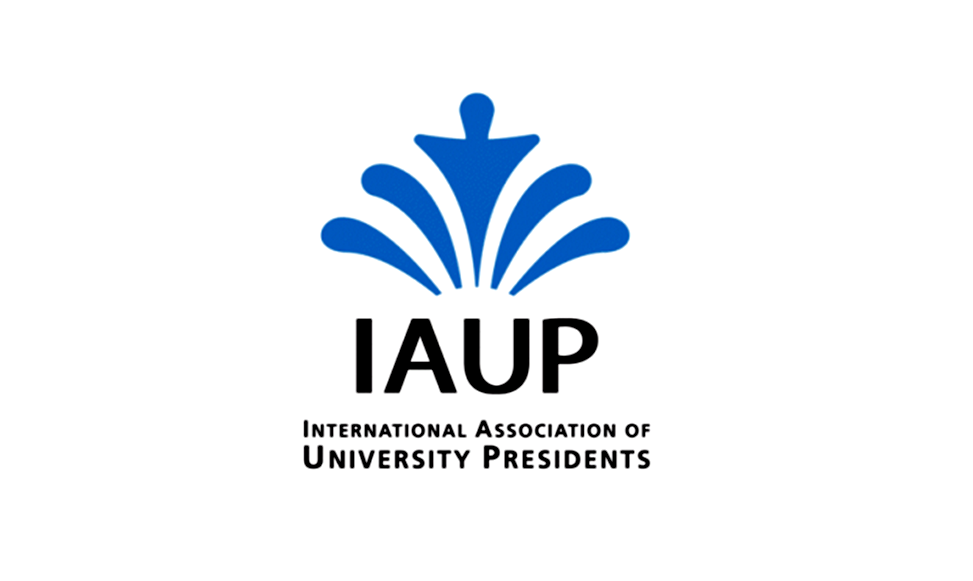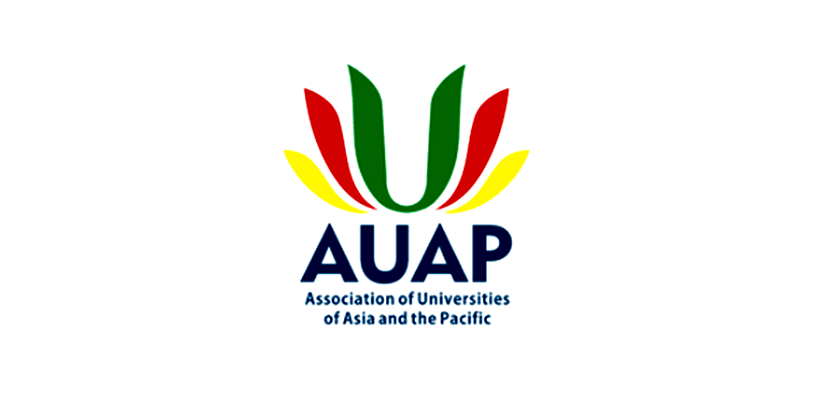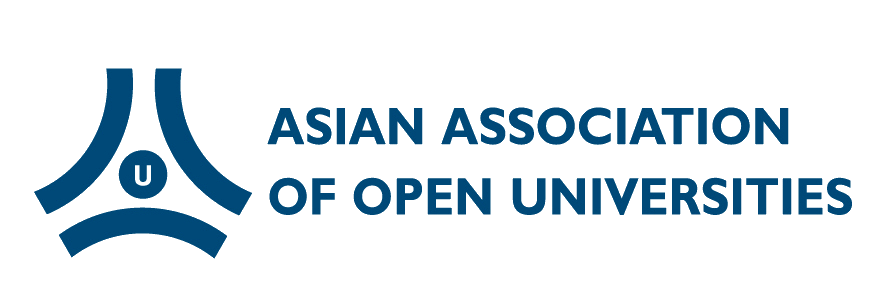Events
Prof. Zhang Jin Chinese Medicine Acupuncture Advanced Training Class Kicks Off in Hangzhou

2025 Zhang Jin Chinese Medicine Acupuncture Advanced Training Class Kicks Off in Hangzhou,
Over 300 Participants Explore the Essence of Needling Techniques
In May 25/26, 2025, the "2025 Zhang Jin Chinese Medicine Acupuncture · Needling Technique Advanced Training Class," hosted by the Joint Graduate School of Traditional Medicine of APSB, officially commenced in Hangzhou. This training program gathered over 300 Chinese medicine acupuncture practitioners, researchers, and clinical physicians nationwide, focusing on the theoretical inheritance and clinical application of needling techniques. Presided over by Professor Che Yanping, Executive Vice President of APSB and Executive Dean of the Joint Graduate School of Traditional Medicine, the opening ceremony featured lectures by renowned acupuncture expert Professor Zhang Jin, creating a high·level academic exchange platform and injecting new momentum into the cultivation of Chinese medicine acupuncture talents.
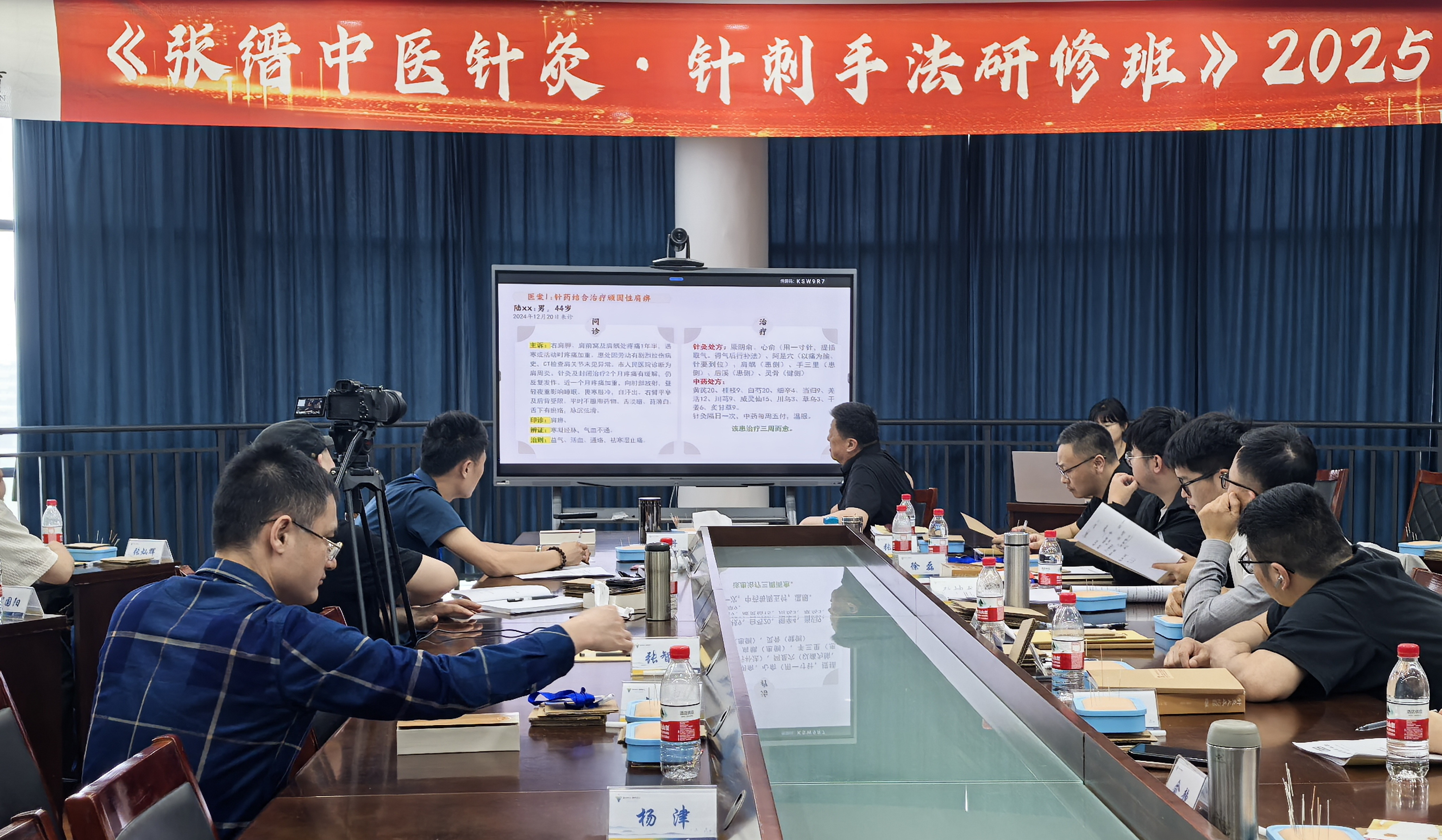
Opening Ceremony: Anchoring Inheritance and Innovation, Empowering Talent Cultivation in Acupuncture
At the opening ceremony, Professor Che Yanping emphasized that as a national treasure, the standardized inheritance and innovative development of acupuncture needling techniques are core to advancing the discipline. She noted that this training class, centered on Professor Zhang Jin's academic system, aims to enhance participants' clinical skills and academic literacy through theoretical lectures, case analyses, and practical drills, enabling acupuncture talents to innovate in inheritance and excel in practice. The ceremony’s academic atmosphere laid a solid foundation for subsequent learning, with participants eagerly anticipating the training content.
Course Schedule: Multidimensional Modules Covering the Entire Chain of Theory and Clinical Practice
1. Theoretical Depth Analysis Module (2 days)
· Classical Literature and Academic Thought: Systematically interpret needling technique theories in *Huangdi Neijing* and *Compendium of Acupuncture and Moxibustion*, Interpretation Professor Zhang Jin's academic system of "syndrome differentiation along meridians and guiding by natural tendencies," analyzing core innovations such as "qi reception threshold" and "quantification of reinforcing/reducing techniques." Modern neurophysiology (e.g., "bidirectional regulation of sympathetic nerves by twirling techniques") is integrated to reveal the scientific mechanisms of acupuncture’s body regulation.
· Comparison of Needling Schools: Review features of schools like "Qilu Needling" and "Jin’s Three·Needle Therapy," using Professor Zhang Jin's clinical cases (e.g., "Treating intractable hiccups with 'Green Dragon Wagging Tail'") to Analyze the symptoms and operational differences of various schools, broadening participants' dialectical thinking.
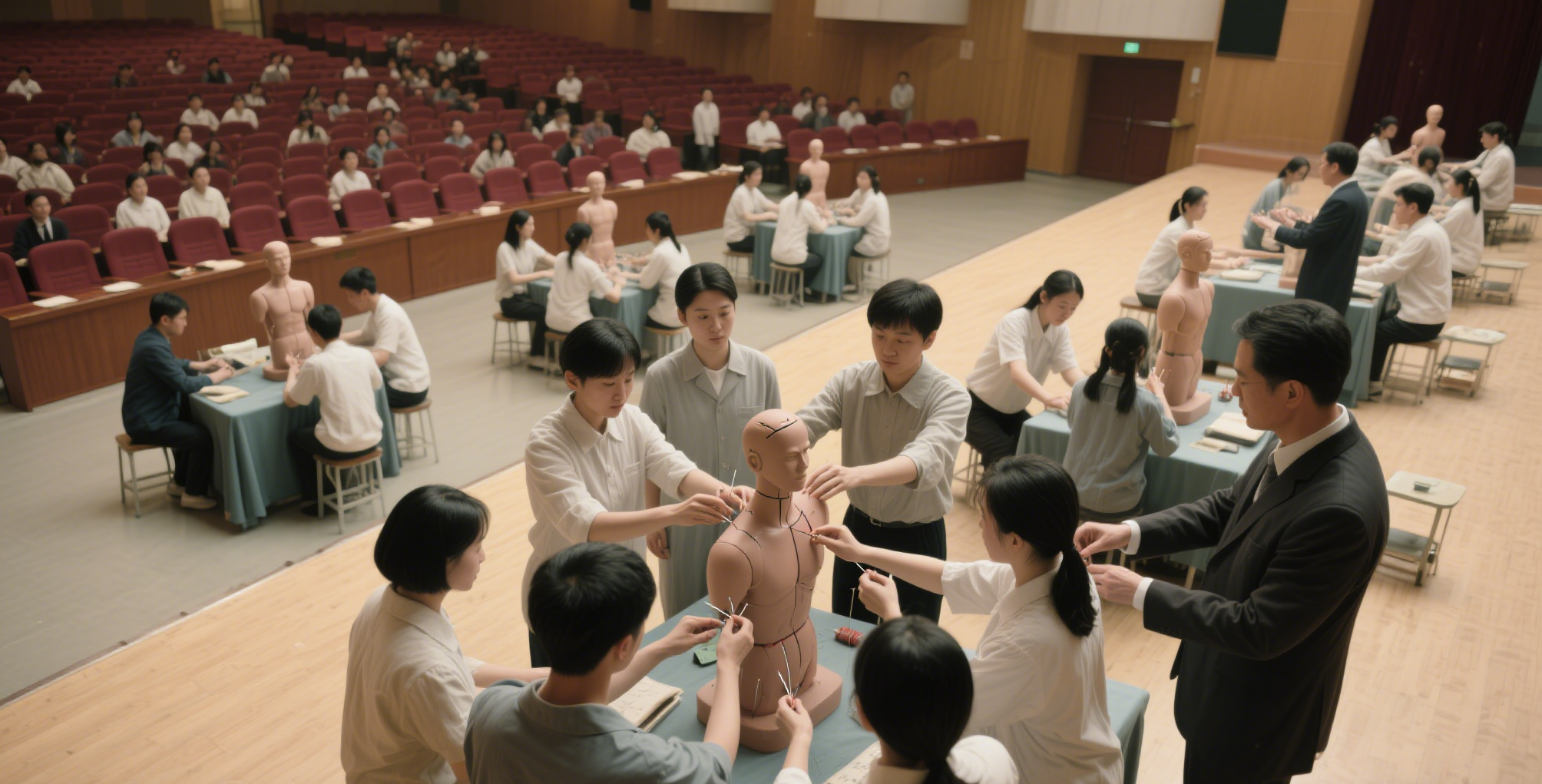
2. Practical Skill Enhancement Module (3 days)
· Standardized Training of Basic Techniques:
· Instructors demonstrate "even reinforcing·reducing" and "lifting·thrusting reinforcing·reducing" techniques. Participants practice on human models with acupoint feedback devices, real·time monitoring of needling parameters to ensure coordination of finger, wrist, and arm strength.
· Simulate "cold/heat syndrome" scenarios, training "Burning Mountain Fire" and "Penetrating Heaven Coolness" techniques. Thermosensitive moxibustion combined with acupuncture is introduced, with instructors correcting "qi sensation conduction" deviations to enhance tactile precision.
· Practical Drills for Complex Conditions:
· Facial Paralysis Treatment: Groups design "Yangming meridian point penetration + distal point combination" schemes, using electromyography to verify the correlation between "facial expression muscle activation" and needling techniques.
· Insomnia Regulation: Integrate *Ziwu Liuzhu* theory, practicing "Needling Taixi at Shenshi (3·5 pm)" and "Needling Shenmen at Haishi (9·11 pm)" to strengthen "timely needling" clinical thinking.
3. Case Discussion and Assessment Module (1 day)
· In·Depth Analysis of Difficult Cases: Select 20 complex cases (e.g., "Combined acupuncture and medication for multiple sclerosis"), with participants reconstructing diagnosis/treatment, extracting the "four differentiation system (meridian, disease, mechanism, technique)," and instructors optimizing clinical decision paths.

Graduation Assessment:
· Theory: Examine classical theories, modern mechanisms, and Professor Zhang Jin's academic thought.
· Practical: Randomly select "reinforcing·reducing techniques" or "specific acupoint needling" for demonstration, with instructors scoring based on "qi sensation control" and other dimensions.
· Case Defense: Simulate clinical consultations, formulating needling plans for "Post·stroke sequelae (qi deficiency and blood stasis syndrome)" and defending them. Qualified participants receive advanced training certificates; outstanding performers obtain *Graduate Diploma* and are included in the university's student academic database.
Teaching Features: Innovative Models Empowering Benchmark Talent Cultivation in Acupuncture
· "Three·Instructor Linkage" System: Professor Zhang Jin (academic leader), his direct disciples (clinical experts), and young scholars (research backbones) collaborate, integrating "theory·clinical·research" (e.g., in "Acupuncture Analgesia Mechanism" courses, research backbones use fMRI for analysis while clinical experts share "cervicogenic headache" solutions).

"Virtual·Real Integration" Training:
· Virtual Simulation: "Acupuncture Digital Human Platform" simulates "meridian qi conduction" like "Flying Through Channels and Moving Qi," providing real·time feedback.
· Physical Training: "Intelligent Acupuncture Models" with pressure sensing and electromyography monitoring generate "technique Standardization reports" (as shown on the screen in the training evaluation interface), enabling instructors to guide precisely and improve training efficiency.
· "Clinical·Research·Teaching" Closed Loop: Synchronously launch "Clinical Efficacy Observation of Needling Techniques" projects. Participants engage in data collection (e.g., "Multicenter controlled study of lifting·thrusting reinforcing·reducing for chronic low back pain"), transforming learning outcomes into research data to support academic inheritance and innovation.
"Lifelong Learning" Resources: After graduation, free access to the "Acupuncture Technique Inheritance Cloud Platform," offering:
· 300+ clinical video libraries (including needling technique demonstrations and case analyses by Professor Zhang Jin).
· Annual frontier courses (e.g., "Integration of Needling Techniques with Artificial Intelligence").
· Alumni communities (online case discussions, offline academic salons), building a national acupuncture talent exchange network.
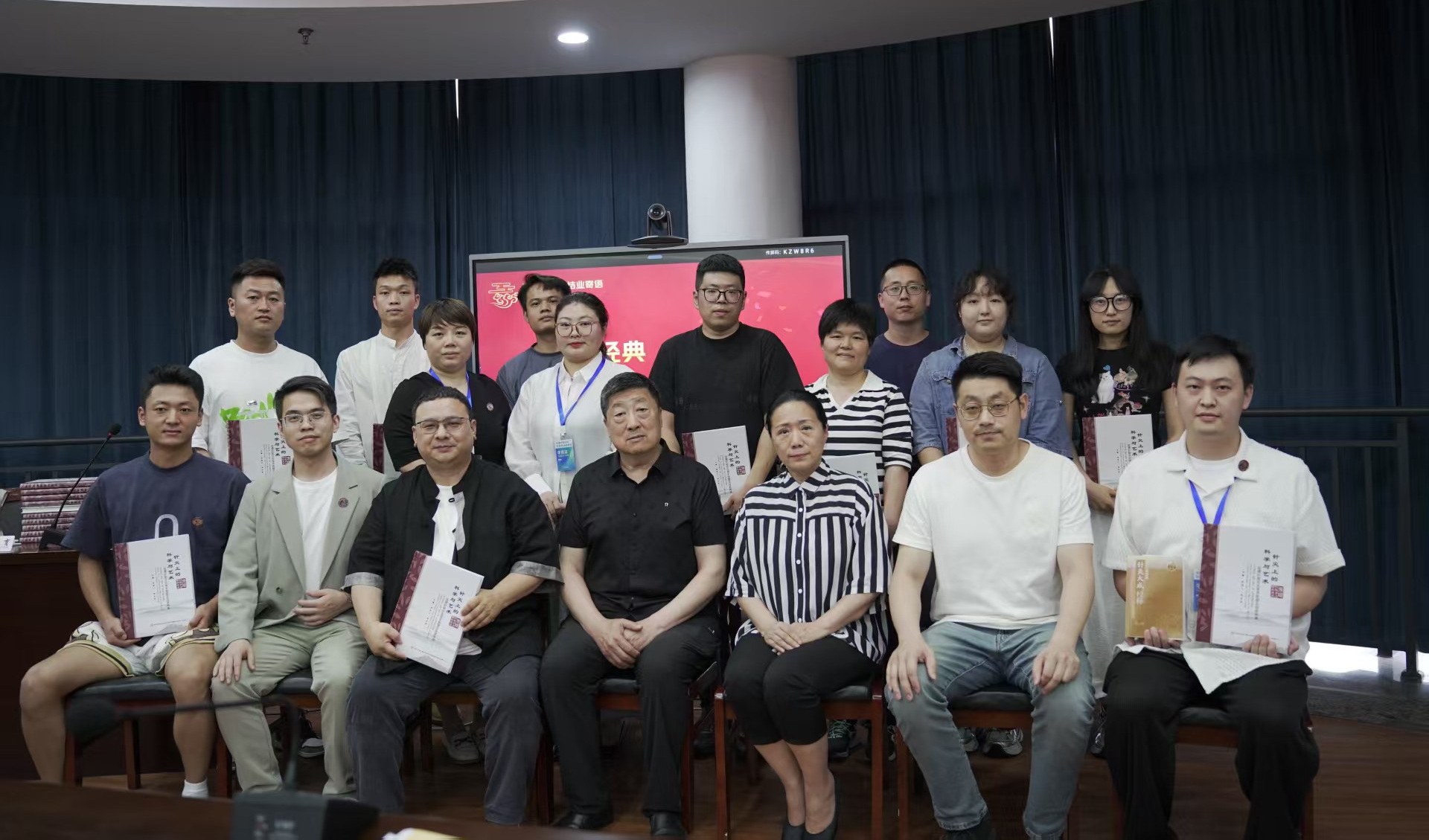
Scale and Impact: Over 300 Participants Unite to Promote Acupuncture Discipline Development
Attracting over 300 participants from clinical, research, and educational fields, the training class highlights the influence of acupuncture. Participants feedback that the course deepened understanding of needling techniques and expanded clinical thinking (e.g., case analysis of "acupuncture combined with auricular points for anxiety disorder"). This program, as a Results of APSB's academic promotion, is a practice of acupuncture inheritance and innovation, cultivating professionals with solid theory and exquisite skills, driving high·quality discipline development.
Conclusion: Inheriting Classics, Innovating Future, Continuing the New Chapter of Acupuncture Academics
With the mission of "inheritance, innovation, practice," this training class, through top·tier faculty and diverse teaching, builds a comprehensive theory·clinical platform. In the future, APSB will continue leveraging disciplinary advantages, hosting high·quality academic activities, promoting acupuncture culture dissemination, and contributing to "Healthy China."


